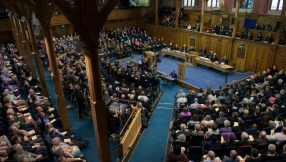
Just 26% of Gen X and 16% of millennials believe that when they die, they will go to Heaven only because they confessed their sins and accepted Jesus as their Savior, compared to nearly half of the generation before them, a new study has found.
The American Worldview Inventory 2021, a survey of the philosophy of life on American adults from Arizona Christian University, assessed the worldviews of four generations: millennials (born 1984-2002), Gen X (1965-1983), baby boomers (1946-1964) and builders (1927-1945).
Researchers found that among other recent generations, millennials have gone farther in cutting ties with traditional Christian views and normative biblical teaching.
For example, nearly half of all boomers believe that when they die, they will go to Heaven only because they confessed their sins and accepted Jesus as their Savior, compared to only 26% of Gen X and 16% of millennials.
A staggering 90% of builders believe you treat others as you want them to treat you, while less than half of millennials agree.
Additionally, 43% of millennials stated they either don't know, don't care or don't believe God exists compared to 28% of boomers, and 44% of millennials believe Satan is a real and influential, compared to 64% of boomers.
The study also found that overall, younger Americans are significantly more likely than the two previous generations to embrace horoscopes as a guide and Karma as a life principle, to see "getting even" with others as defensible, to accept evolution over creation, and to view owning property as fostering economic injustice.
On spiritual matters, Americans younger than 55 are far more likely to distrust the Bible and to believe God is uninvolved in people's lives.
Interestingly, a majority of Americans call themselves Christian, ranging from 57% of millennials to 83% of builders.
Researchers warn that the beliefs and behaviors of younger Americans, especially millennials, "threaten to reshape the nation's religious parameters beyond recognition."
"In fact, this radical spiritual revolution has created a generation seeking a reimagined world without God, the Bible, or churches," they wrote.
Commenting on the study, George Barna, CRC director of research, said that Gen X and the millennials have "solidified dramatic changes in the nation's central beliefs and lifestyles," adding: "The result is a culture in which core institutions, including churches, and basic ways of life are continually being radically redefined."
The American World Inventory corroborates an earlier study from Barna that found that two-thirds of teens and young adults (65%) agree that "many religions can lead to eternal life" compared to 58% of teens and young adults surveyed in 2018.
Additionally, 31% of teens and young adults "strongly agree" that what is "morally right and wrong changes over time, based on society," compared to just 25% in 2018.
Recent survey data released by Gallup found that one in six Gen Z adults identify as LGBT — the highest percentage of any generation in history — and that number is likely to continue to increase.
Jacob Bland, the new president and CEO of Youth for Christ, told The Christian Post that despite the challenges facing today's young people, he looks toward the future with optimism.
"Teens today are facing crises like never before, but it's often in the darkness that light shines the brightest," he said. "To enter into a disciple-making relationship where you're introducing a kid to an unconditional love that maybe they've never even considered, showing them the goodness and love modeled in Jesus — there's a lot of hope in that."
"Jesus has a way of being new and fresh for the circumstances of today, and He is certainly doing that," Bland added.
Courtesy of The Christian Post













